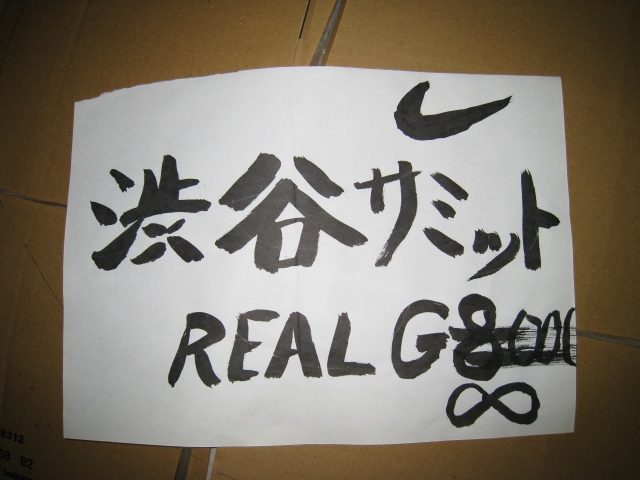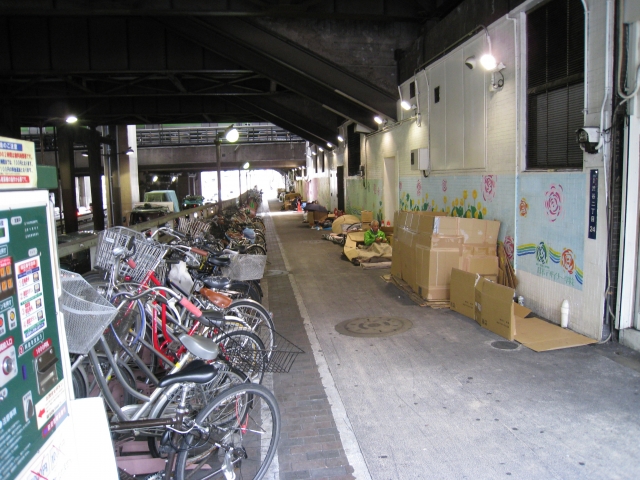From the Open-Publishing Calendar
From the Open-Publishing Newswire
Indybay Feature
G8 Dispatches: Contested Spaces in Tokyo
We are a group of Bay Area (and ex-Bay Area) activists who are in Japan gearing up, along with organizers from Japan and around the world, to protest the upcoming G8 meetings in Hokkaido. Here is the first of a series of regular reports we will be posting to share our experiences, discuss what we are learning about Japanese social movements, and report on the anti-G8 actions.
G8 Dispatches: What Does Nike Have to do with Tokyo's Homeless?
By Marina Sitrin and David Solnit and Asha Colazione and Sarah Lazare, AlterNet
Posted on June 27, 2008, Printed on June 27, 2008
http://www.alternet.org/bloggers/www.alternet.org/89425/
Like many other foreigners, we arrived in Japan holding stereotypes of Japan as a prosperous country, not one where tens of thousands of people live in the streets. Surprised by the level of visible poverty and homelessness we saw, we realized our assumptions were wrong. The next question was how to write about the issues of homelessness and displacement with relation to the policies of the G8 and international financial institutions. Last night the answer to this question appeared.
Under the bright-as-day glow of bustling Shibuya Square, we had the honor of meeting organizers from Miyashita Park. Used for a wide range of activities by the community and activists during the day, Miyashita Park is home to dozens of people by night. But change is on the horizon for the park: it has been sold by the municipality to Nike.
Yup, Nike. The brand name, the sneaker, the swoosh that just does it. Nike has bought the park. It is private now, no longer the domain of the people of the neighborhood. Nike is in the process of building walls to keep out the community, and of course closing it at night so it is no longer anyone's home. Privatization of parks by international corporations, causing more displacement and homelessness - thanks, Nike, for helping us make the connection.
The Japanese economy is characterized by free market trade policies, an overwhelming private sector, low tax rates, and a minimal social safety net. At virtually every bump in the road over the past several decades, from the world oil crisis of 1973 to the bubble burst and economic recession of the 1990s, the Japanese government has responded with aggressive privatization measures. Safety nets for the poor and elderly have been stripped away while public goods and spaces have been sold off to large corporations. Such policies have made Japan the darling of transnational organizations like the G8, WTO, IMF, and World Bank, who claim that Japan's aggressive pursuit of neo-liberal policies have transformed it into a prosperous nation.
Yet, as Japan's bare free market trade policies have increased, so too has the underclass of low-wage precarious workers, underemployed youth, and homeless people. The rise in neo-liberalism has seen a shift towards under and partial employment, especially among young people, and day laborers find it increasingly difficult to get steady work. A staggering 30,000 people live on the streets of Japan, most of whom are single, older men. Not only are they faced with precarious working conditions and diminished welfare programs, but the Japanese government works aggressively to hide them away, forcibly removing them from the parks, sidewalks, and other public spaces where they live. In addition, private developers and corporations run massive work programs which "hire" these same people who have been displaced, to work on job sites where they have to pay for every meal as well as their housing. At the end of a job, workers often have little or no money left, having spent all of it to pay for the meager living conditions they were provided.
In response to these conditions, several communities of homeless people have organized amongst themselves, building tight-knit encampments where people look out for each other, share resources, and fight against government attempts at eviction. In some cases, NGOs have joined in the chorus of voices advocating for the rights of the homeless to maintain their communities.
The organizers we met last night took us to the site of a government "beautification" project. They explained that over the past year, the government has been trying to "clean up" the area around Miyashita Park, commissioning art students to paint the walls beneath a nearby bridge where homeless people sleep. Of course this entailed evicting the residents of the neat row of cardboard boxes that lined the underpass. But homeless organizers fought the eviction and eventually won back their camp.
As we walked under the bridge, we were struck by the orderliness of the cardboard houses, some beautifully decorated by their inhabitants with dangling chimes or painted images. One cardboard house - belonging to a homeless activist - was built out of Nike boxes, with painted yellow stars covering the black swooshes.
Behind these houses loomed a government-commissioned mural of the "beautification" attempt: a "cheery," flowered landscape in bright pink and blue hues. The contrast was striking: this was a war of appearances, a struggle over who gets to define the beauty and function of a space.
The G8 protests are fundamentally about how public goods and spaces are used, and who gets to decide. Should land, water, and public space simply be sold off to the highest bidder, or should communities have control over the decisions that affect their lives?
Last night, while we were meeting with the activists who showed us around the homeless encampment, one organizer wrote "No G8" in English and Japanese on a piece of paper. We all looked at it and one woman asked, "What do we want instead of a G8?" After a bit of discussion, the young man pulled out a new piece of paper, and in English and Japanese, wrote: "We are the real G8." Then he changed it to "We are the real G-8 billion." Then, after thinking about it for a few moments longer, he crossed that out and changed it to "We are the real G-infinity."
All G8 dispatches can be viewed at http://www.alternet.org/bloggers/www.alternet.org/89425/
By Marina Sitrin and David Solnit and Asha Colazione and Sarah Lazare, AlterNet
Posted on June 27, 2008, Printed on June 27, 2008
http://www.alternet.org/bloggers/www.alternet.org/89425/
Like many other foreigners, we arrived in Japan holding stereotypes of Japan as a prosperous country, not one where tens of thousands of people live in the streets. Surprised by the level of visible poverty and homelessness we saw, we realized our assumptions were wrong. The next question was how to write about the issues of homelessness and displacement with relation to the policies of the G8 and international financial institutions. Last night the answer to this question appeared.
Under the bright-as-day glow of bustling Shibuya Square, we had the honor of meeting organizers from Miyashita Park. Used for a wide range of activities by the community and activists during the day, Miyashita Park is home to dozens of people by night. But change is on the horizon for the park: it has been sold by the municipality to Nike.
Yup, Nike. The brand name, the sneaker, the swoosh that just does it. Nike has bought the park. It is private now, no longer the domain of the people of the neighborhood. Nike is in the process of building walls to keep out the community, and of course closing it at night so it is no longer anyone's home. Privatization of parks by international corporations, causing more displacement and homelessness - thanks, Nike, for helping us make the connection.
The Japanese economy is characterized by free market trade policies, an overwhelming private sector, low tax rates, and a minimal social safety net. At virtually every bump in the road over the past several decades, from the world oil crisis of 1973 to the bubble burst and economic recession of the 1990s, the Japanese government has responded with aggressive privatization measures. Safety nets for the poor and elderly have been stripped away while public goods and spaces have been sold off to large corporations. Such policies have made Japan the darling of transnational organizations like the G8, WTO, IMF, and World Bank, who claim that Japan's aggressive pursuit of neo-liberal policies have transformed it into a prosperous nation.
Yet, as Japan's bare free market trade policies have increased, so too has the underclass of low-wage precarious workers, underemployed youth, and homeless people. The rise in neo-liberalism has seen a shift towards under and partial employment, especially among young people, and day laborers find it increasingly difficult to get steady work. A staggering 30,000 people live on the streets of Japan, most of whom are single, older men. Not only are they faced with precarious working conditions and diminished welfare programs, but the Japanese government works aggressively to hide them away, forcibly removing them from the parks, sidewalks, and other public spaces where they live. In addition, private developers and corporations run massive work programs which "hire" these same people who have been displaced, to work on job sites where they have to pay for every meal as well as their housing. At the end of a job, workers often have little or no money left, having spent all of it to pay for the meager living conditions they were provided.
In response to these conditions, several communities of homeless people have organized amongst themselves, building tight-knit encampments where people look out for each other, share resources, and fight against government attempts at eviction. In some cases, NGOs have joined in the chorus of voices advocating for the rights of the homeless to maintain their communities.
The organizers we met last night took us to the site of a government "beautification" project. They explained that over the past year, the government has been trying to "clean up" the area around Miyashita Park, commissioning art students to paint the walls beneath a nearby bridge where homeless people sleep. Of course this entailed evicting the residents of the neat row of cardboard boxes that lined the underpass. But homeless organizers fought the eviction and eventually won back their camp.
As we walked under the bridge, we were struck by the orderliness of the cardboard houses, some beautifully decorated by their inhabitants with dangling chimes or painted images. One cardboard house - belonging to a homeless activist - was built out of Nike boxes, with painted yellow stars covering the black swooshes.
Behind these houses loomed a government-commissioned mural of the "beautification" attempt: a "cheery," flowered landscape in bright pink and blue hues. The contrast was striking: this was a war of appearances, a struggle over who gets to define the beauty and function of a space.
The G8 protests are fundamentally about how public goods and spaces are used, and who gets to decide. Should land, water, and public space simply be sold off to the highest bidder, or should communities have control over the decisions that affect their lives?
Last night, while we were meeting with the activists who showed us around the homeless encampment, one organizer wrote "No G8" in English and Japanese on a piece of paper. We all looked at it and one woman asked, "What do we want instead of a G8?" After a bit of discussion, the young man pulled out a new piece of paper, and in English and Japanese, wrote: "We are the real G8." Then he changed it to "We are the real G-8 billion." Then, after thinking about it for a few moments longer, he crossed that out and changed it to "We are the real G-infinity."
All G8 dispatches can be viewed at http://www.alternet.org/bloggers/www.alternet.org/89425/
For more information:
http://www.alternet.org/bloggers/www.alter...
Add Your Comments
We are 100% volunteer and depend on your participation to sustain our efforts!
Get Involved
If you'd like to help with maintaining or developing the website, contact us.
Publish
Publish your stories and upcoming events on Indybay.
Topics
More
Search Indybay's Archives
Advanced Search
►
▼
IMC Network




